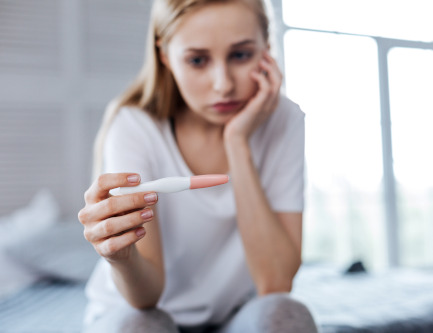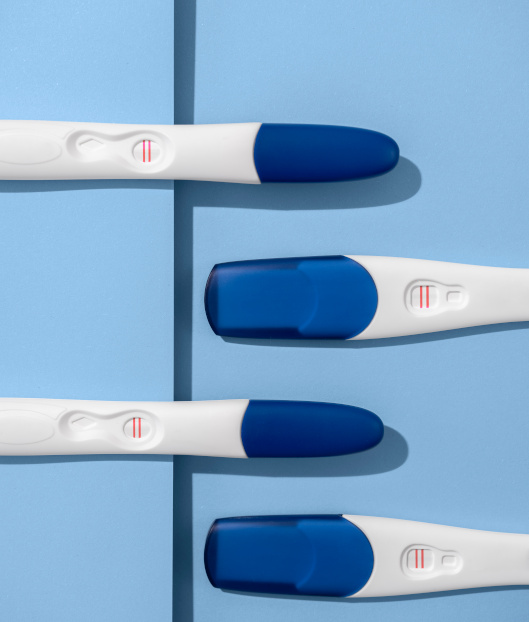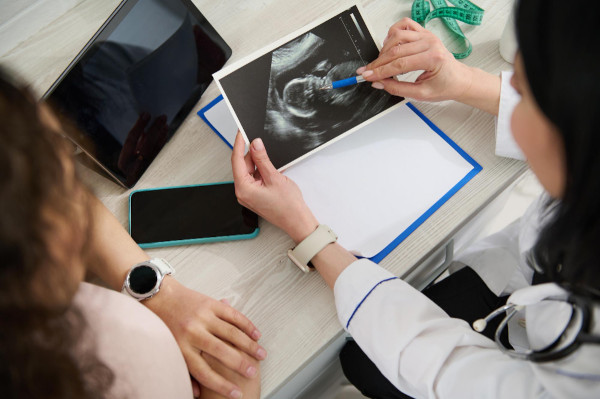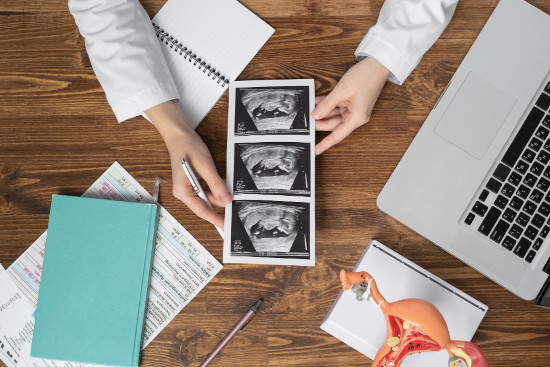Post-embryo transfer testing
A pregnancy test is one of the simplest ways to determine the success of the IVF procedure. Reproductive specialists recommend testing no earlier than two weeks after embryo transfer. Testing before the scheduled time is not recommended, as it may yield a false positive or false negative result.

specialists

equipment

treatment

Using test strips
Why shouldn't you take pregnancy tests after embryo transfer? Pharmacy tests measure the concentration of human chorionic gonadotropin in the urine, which begins to be produced after the blastocyst implants in the uterus. If the hormone level is too low, the test strip will give a negative result.
Quickly, rapid test results obtained before day 14 don't match those obtained in the clinic. There may be several reasons for this:
- Large difference in hCG levels in urine and blood
- Insufficient sensitivity of the test strip reagent to hormones
- Changes in blood hormone levels associated with the administration of hCG prior to oocyte retrieval
When testing with a test strip, many women receive a false negative result. This may be due to insufficient sensitivity of the reagent. For example, as early as 9 days after embryo transfer, the hCG concentration in the blood may reach 21 mIU/ml. Most pharmacy tests only detect the hormone if its level reaches 25 mIU/ml.
Negative Test Result
What should I do if the test is negative after embryo transfer? A woman can repeat the test if desired. However, when choosing a suitable test strip, it's important to consider its sensitivity: the lower the number indicated on the packaging, the higher the reagent's sensitivity to hCG. Some jet and cassette tests have a sensitivity of up to 10 mIU/ml. These tests can be used to determine the success of IVF as early as 8-9 days after embryo transfer.

Features of the test
When should I test after embryo transfer? As mentioned, testing should be done 14 days after the IVF procedure. Reproductive specialists highlight several rules that must be taken into account before performing the test:
- Only the first morning urine is used for testing.
- Test results are assessed after a few minutes.
- The test should be performed at a temperature of 23-26 degrees Celsius.
- The test strip is placed in the urine for 5-7 seconds.
Interpreting Results
After using cassette, jet, and other rapid tests, the following results are obtained:
- Negative – most often indicates the absence of pregnancy or a stillbirth.
- Doubtful – indicates late implantation of blastocysts into the endometrium, an ectopic pregnancy, or a premature rapid test.
- Positive – highly likely indicates For a successful IVF procedure
To obtain a reliable result, it is recommended to have a blood test at a fertility center. Laboratory tests are more sensitive and can also determine the hCG level in the blood serum. The results can be used to assess the progress of the pregnancy and the likelihood of multiple or ectopic pregnancy.

Ultrasound after IVF
Only after an ultrasound examination can one determine the success of the IVF procedure. The first ultrasound is performed 21 days after embryo transfer. During the examination, the specialist pays special attention to the following indicators:
- Embryo location
- Embryo attachment to the endometrium
- Presence of uterine hypertonicity
- Embryo detachment
- Condition of the gonads
The first ultrasound not only confirms pregnancy but also identifies possible pathologies. If the embryo has implanted in the fallopian tube or inside the ovary, gestation is terminated. Hypertonicity of the myometrium indicates a high risk of spontaneous abortion. Therefore, if a problem is detected, appropriate treatment is administered.

Types of ultrasound examination
Two types of ultrasound can be used to monitor the progress of gestation:
- Transabdominal (external) ultrasound – performed using a transducer placed on the outer abdominal wall. This type of ultrasound is most often used later in gestation – in the second and third trimesters.
- Transvaginal ultrasound – performed using a sensitive transducer inserted into the vagina. This method is more accurate and allows for early pregnancy diagnosis.
According to statistics, in vitro fertilization is successful in 40% of cases. Often, during the final stage of IVF, multiple embryos are transferred into the uterine cavity. In most cases, only one embryo implants in the endometrium, but the possibility of multiple pregnancies cannot be ruled out. The first ultrasound can also detect an ectopic pregnancy, which can lead to not only fetal death but also rupture of the fallopian tube.
Conclusion
An hCG test can assess the success of the IVF procedure as early as 14 days after embryo transfer. Before this time, testing and rapid tests are not recommended, as they can produce false-negative and false-positive results. After three weeks, the first ultrasound is performed to determine the progress of the pregnancy, the risk of miscarriage, and other abnormalities.
Our doctors

This award is given to clinics with the highest ratings according to user ratings, a large number of requests from this site, and in the absence of critical violations.

This award is given to clinics with the highest ratings according to user ratings. It means that the place is known, loved, and definitely worth visiting.

The ProDoctors portal collected 500 thousand reviews, compiled a rating of doctors based on them and awarded the best. We are proud that our doctors are among those awarded.
Make an appointment at a convenient time on the nearest date
Price
Other services

































Features of a pregnancy test
An increase in hCG levels is a clear sign of pregnancy. A special test is performed to determine its level in the blood. Human chorionic gonadotropin is normally produced only after the blastocyst implants in the endometrium. The hormone can be detected not only in the blood but also in the urine.
Pharmacy-available rapid tests can diagnose pregnancy with high accuracy (over 90%). However, they should not be performed earlier than two weeks after embryo transfer. Otherwise, the likelihood of false-negative and false-positive results increases several times.